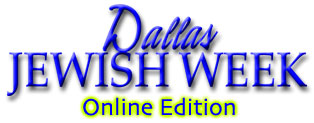| Dallas Jewish Week Menu
|
 |
A 'gap' in the Yeshiva
Conservative Yeshiva to offer pre-college year
by Rebecca A. Utay
DJW Staff
The United Synagogue of Conservative Judaism (USCJ) has announced a new program for high school graduates. Beginning September 2002, the Conservative Yeshiva of the United Synagogue in Jerusalem will open its Pre-College Yeshiva Year - the 'gap year'.
"This program will offer North American high school graduates the opportunity to study Rabbinic texts in an open-minded, egalitarian atmosphere, while retaining the intensity associated with traditional Yeshiva learning," said Rabbi Joel Roth, Rosh Yeshiva.
Rabbi Roth teaches two Bible courses, one Jewish law course and one in Hebrew grammar. And he sometimes gives general lectures to the entire Yeshiva. He said, "Next year I hope to teach Talmud, because that's what my doctorate is in." Roth was ordained at the Jewish Theological Seminary of America (JTSA) and is still on faculty there. Although currently on leave, he is a professor of Talmud and Jewish law at JTSA.
The Conservative Yeshiva, now in its seventh year, has grown from two students at the beginning to more than 50 students, full- and part-time, this year, according to Rabbi Daniel Goldfarb, the school's director. The new program will provide housing, meals and enhanced learning opportunities for students in this Pre-College age group.
The classes at the Yeshiva will focus on traditional Jewish texts, Bible, Talmud, Midrash and Halacha (Jewish law) as well as Philosophy, Chasidut and siddur. Rabbi Goldfarb said, "The emphasis is on teaching the skills needed for one to feel comfortable studying these texts. Another goal is to convey a desire to keep learning after the student leaves the Yeshiva," he believes, "indeed for life."
Two different methods of study will prevail within the gap year program, said Goldfarb. The learning is done in the classical Yeshiva manner - a combination of chevruta (study in pairs) and shiur (class discussion with a teacher). "About half or slightly more of the time is spent in chevruta in preparation for the shiur."
The format of the classes and classrooms is rather open and friendly, as Goldfarb said. "The atmosphere is very warm and supportive. When the students are learning in chevruta, the Beit Midrash (study room) is alive with the hum of lively discussion." He added, "The teachers are available and move through the room answering questions and helping [the students]."
There is no mandatory grading system for the 'gap year' program, Goldfarb said. "The learning at the Yeshiva is Torah L'shma, 'learning for its own sake.' We do not take attendance or give exams, papers or credit. This means that there is no competitive element in the learning," he said. "And the motivation remains very high. The only reason people come to the Yeshiva is to learn, and that is the greatest motivator of all."
However, Goldfarb said, "The Yeshiva is under the academic auspices of the JTSA, and if a student would like to receive credit for study, we are prepared to give him or her an exam or require a paper and to provide a transcript." He added, "We will be happy to do this for students in the Pre-College program who would like to show credit to the colleges they will be attending."
The Yeshiva experience is coed, said Goldfarb. "It is egalitarian, meaning that women and men learn together and pray together on an equal basis, including reading the Torah, leading the service and being counted in the minyan (prayer quorum)." He also explained that the program is open to anyone who wants to learn, regardless of professional plans. The school is open to students from all Jewish backgrounds who wish to engage in serious text study.
Those who attend will experience what they call 'communal learning and living'. Rabbi Goldfarb explained, "The students and faculty make up a religious community in which prayer and observance are no less important than the text learning component," he maintains. "We do not force this on the students, but most participate willingly and find it an important part of their Yeshiva year."
The Yeshiva gap year promises to be a different academic experience for students, according to USCJ Executive Vice President Rabbi Jerome Epstein. "The Pre-College Year will be one of tremendous intellectual, personal and religious growth for participants. Students will be exposed to an exciting new peer group, the richness of Israel and a stimulating learning experience very different from high school. Students will go on to college able to serve as knowledgeable Jewish leaders on campus and in the Jewish community."
Rabbi Gail Diamond, a teacher at the Yeshiva, believes the students are a very important part of the school. "Pre-College students are a wonderful asset to the Conservative Yeshiva. The Yeshiva attracts students who are bright, motivated and serious about their Jewish learning. Pre-College students bring energy and enthusiasm to their studies and are active participants in all aspects of the Yeshiva program."
The teachers and rabbis of the Conservative Yeshiva hope to have good attendance in their first experience with the 'gap year.' Looking forward to the program's debut, Rabbi Roth said, "As a teacher, I can watch the wheels of [the students'] minds turn as they grapple with religious issues that come out of the texts that we're studying that they've never confronted before." He adds proudly, "It is both for the students and the teachers a very moving experience."
This story was published in the DallasJewishWeek
on: Friday, July 19, 2002
Copyright 2001, Dallas Jewish Week